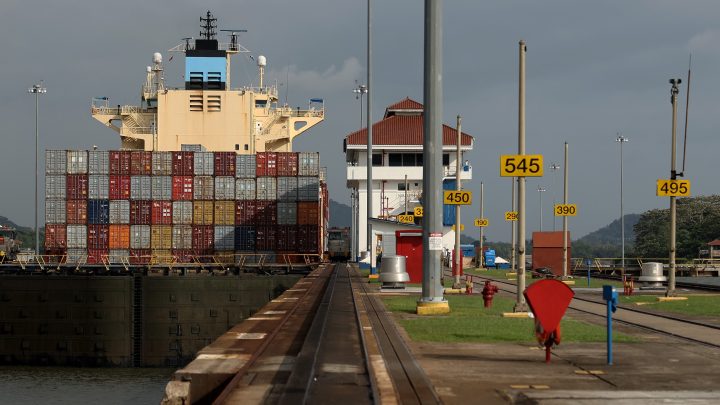
As war and drought throttle supply chains, importers reopen pandemic playbooks
As war and drought throttle supply chains, importers reopen pandemic playbooks

During the pandemic, the cost of moving a full shipping container by sea went through the roof. By last year, prices had dropped way down from their pandemic highs, but were still higher than before the pandemic.
Late last year, though, shipping costs started to pick up again. Since December, the World Container Index from supply chain advisory firm Drewry has more than doubled. Right now, it’s at its highest level since late 2022.
The price spike is the result of problems on two of the world’s most important trade routes: the Panama Canal, where low water levels have limited the number of ships that can pass through, and the Suez Canal, where attacks in the Red Sea by Yemen’s Houthi rebels are throttling shipping.
Those two problems are affecting supply chains for importers in the U.S.
When the Panama Canal Authority started limiting the number of ships that could pass through the canal last year, Cathrine Reynolds, who handles imports at Palmetto Tile Distributors, shrugged off the news.
“I’ll admit that when I got the first emails about the Panama Canal, I’m like, ‘Oh, it doesn’t affect me,’” Reynolds said.
Palmetto Tile is based in South Carolina. It gets some of its tiles from vendors in the U.S., but mostly imports from Europe. That means none of its tile has to go through the Panama Canal — at least, that’s what Reynolds thought.
“The other day, I ordered some inventory from this particular vendor in California, and it’s one of their import goods,” she said. “I was told it was back-ordered because they’re waiting for a container to arrive.”
That container was coming from Brazil. It was stuck, waiting to get through the Panama Canal.
“It just depends on what queue they’re in for the canal, to get through, get to port, then clear customs, and then get to my vendor, and then I’ll finally get the goods,” Reynolds said.
On the other side of the world, shippers have been diverting traffic away from the Red Sea, sending it all the way around Africa instead.
Pat Whelan, who handles imports for Sahadi Fine Foods in Brooklyn, New York, said he’s been getting emails with that bad news.
“What they do is they send these notices that we’re going to add X number of dollars to the next movement,” Whelan said.
In some cases, Whelan said he’s had to pay an extra $1,000 per container for imports including Greek olive oil, Lebanese hummus and tahini.
Those goods are coming from countries in the eastern Mediterranean, which means they don’t even have to pass through the Red Sea. But Whelan said the big container ships loaded with his tahini and olive oil are having to wait around for other goods on those diverted ships.
“That bigger vessel is going to ship with less goods on it. Therefore it’s going to be more costly per container on that ship,” he said. “Or, it’s going to try to wait a little bit and have that boat sit idle for a couple days, waiting for that other stuff to catch up.”
Even though his shipments are costing him more, Whelan said, he’s trying to make sure he’s well-stocked, given all these ongoing delays.
“We’re ordering much more from that area than we would at this time of year, to compensate,” said Whelan.
Other companies are rethinking whether they want to put goods on ships to begin with.
“The main alternative when there’s a shipping issue on the water is you put the item in the air,” said Adam Miller, the founder and owner of Revel Bikes, based in Colorado.
Miller’s company imports bike frames from Asia, and he said those shipping lanes are fine. But Revel also sells a lot of bikes in Europe, and right now, he said, shipping bikes there by air is the best way to avoid the headaches of shipping them by sea.
That said, air freight isn’t exactly cheap.
“We end up spending about 10 times, if not more, than the costs to ship that bike on the ocean,” Miller said.
He said if the company needs to send a lot of bikes to Europe, it’ll probably wait until the Red Sea situation settles down. But if a distributor needs just a handful of bikes to put on the sales floor, Miller said the added cost of air freight is worth it, just to keep his customers happy.
“For a company like Revel, we’re about 5 years old right now,” Miller said. “We’re a relatively young company in the big scheme of things. So for us, the most important thing is to have good, reliable delivery.”
Miller said that’s a lesson his company learned early in the pandemic, when supply chains around the world were congested.
“The ones that had products and the ones that were able to ship products to bike shops and to customers were successful,” Miller said. “And we were very lucky. We did a very good job with delivering products to customers, and now we’ve sort of set that expectation.”
Miller said on the plus side, it’s ski season in Europe right now. The hope is, once bike season arrives in the spring, shipping by ocean will ease up again.
There’s a lot happening in the world. Through it all, Marketplace is here for you.
You rely on Marketplace to break down the world’s events and tell you how it affects you in a fact-based, approachable way. We rely on your financial support to keep making that possible.
Your donation today powers the independent journalism that you rely on. For just $5/month, you can help sustain Marketplace so we can keep reporting on the things that matter to you.











